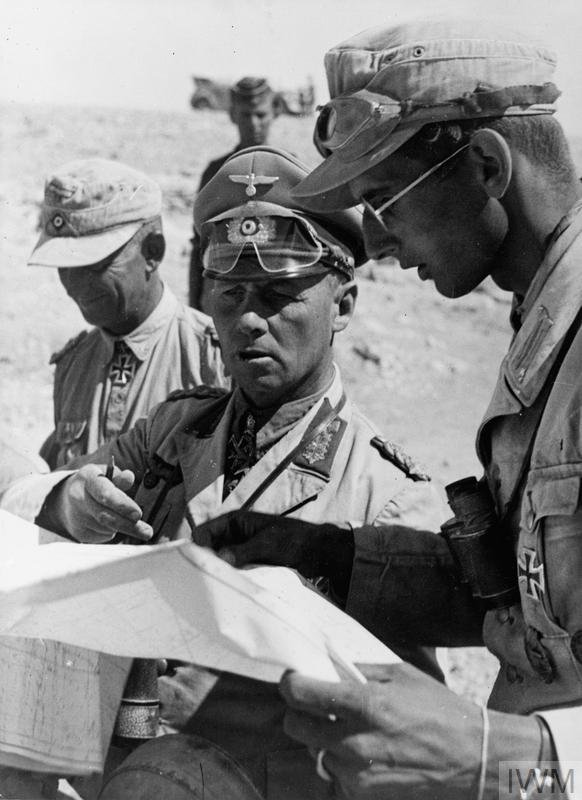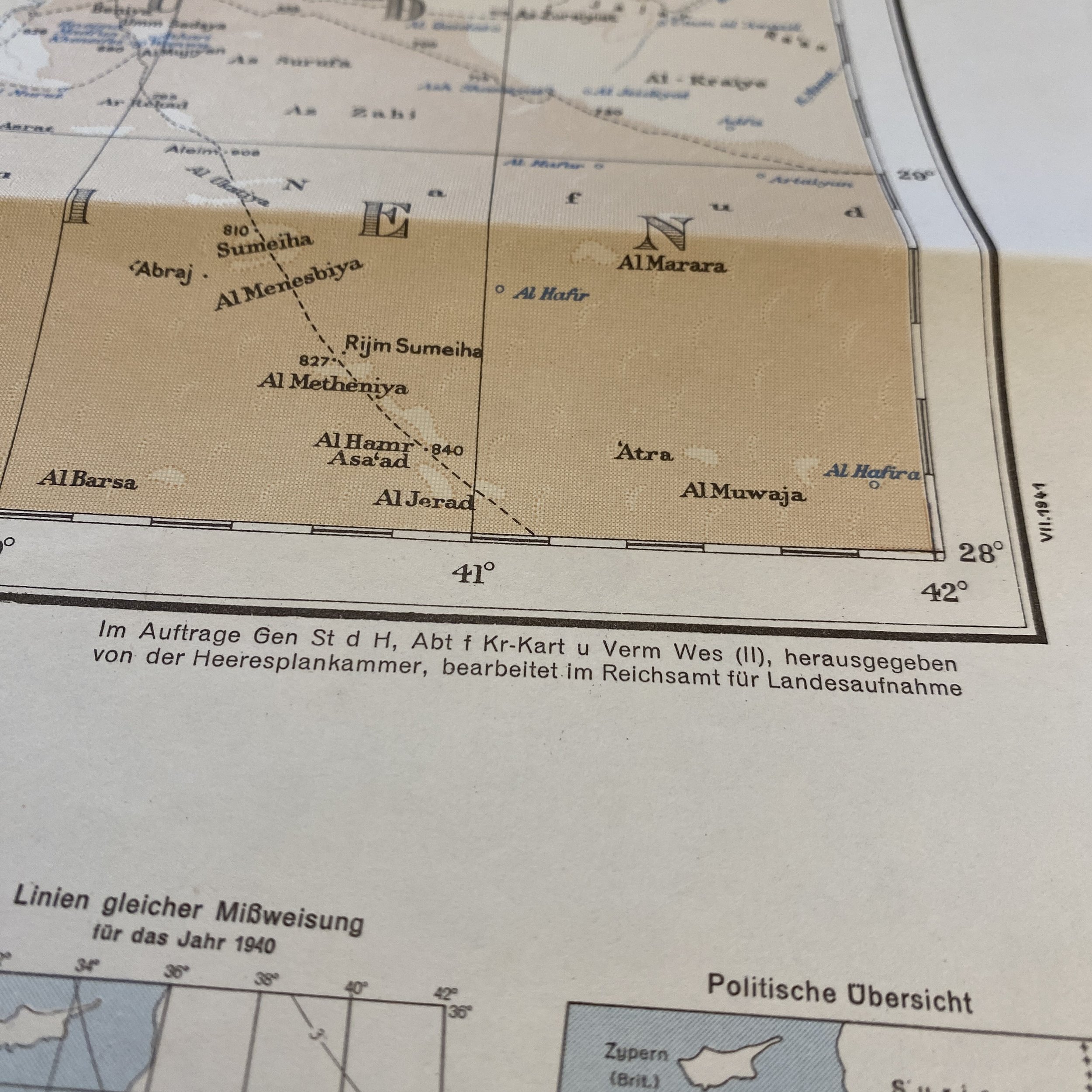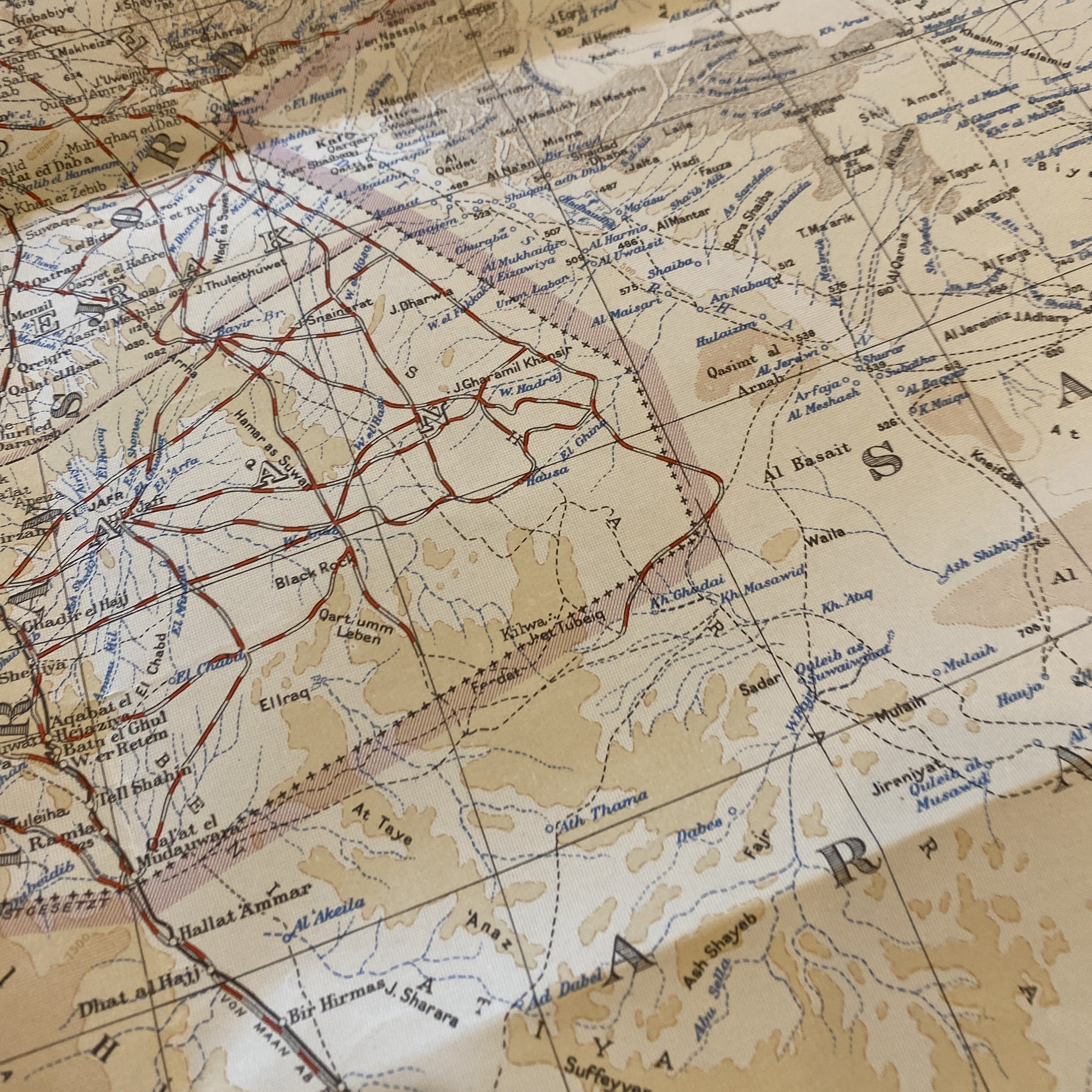RARE! WWII 1941 General Erwin Rommel’s Army German Division Operation Desert Fox Cairo Combat Map































RARE! WWII 1941 General Erwin Rommel’s Army German Division Operation Desert Fox Cairo Combat Map
Comes with hand-signed C.O.A.
This incredibly rare and museum-grade World War II German map of North Africa was used during General Erwin Rommel’s Operation Desert Fox and advance through North Africa and captured the city of Tobruk. With the capture of Tobruk, the German forces gained a strategic advantage in the region and began to move towards Cairo. As German forces approached Cairo, the city was put under martial law, and a curfew was imposed on its residents. The German occupation of Cairo was marked by a significant increase in the number of checkpoints and patrols, which were set up throughout the city to maintain order and prevent any resistance from the local population.
Dated 1941, this German troop map was a limited printing and shows extensive detail of the operational area around Cairo. The German occupation of Cairo during World War II was a significant event that had a significant impact on the city and its people. From 1941 to 1942, German forces were stationed in and around Cairo, using the city as a strategic base for their military operations in North Africa.
During the occupation, the German forces confiscated food, fuel, and other essential supplies from the local population. This led to significant shortages and rationing, making life difficult for the people of Cairo. Many families were forced to flee the city and seek refuge elsewhere.
The German occupation of Cairo also had a significant impact on the city's architecture and infrastructure. German forces bombed and destroyed many important buildings and monuments, including the famous Khedivial Opera House, which was set ablaze in 1971 by German soldiers during their retreat.
Despite the harsh conditions imposed by the German occupation, there were instances of resistance by the local population. Egyptian nationalist groups, such as the Muslim Brotherhood and the Wafd Party, organized protests and demonstrations against the occupation. However, these movements were quickly suppressed by the German forces, who were determined to maintain their control over the city.
In conclusion, the German occupation of Cairo during World War II was a significant event that had a profound impact on the city and its people. The occupation led to widespread hardship and suffering for the local population, and many important buildings and monuments were destroyed. While there were instances of resistance, the German forces were ultimately successful in maintaining their control over the city until their eventual defeat in 1942.
The German occupation and conquest of North Africa during World War II was a significant event that had a profound impact on the region's history. From 1941 to 1943, German forces, led by General Erwin Rommel, known as the "Desert Fox," waged a campaign to conquer North Africa, including countries such as Libya, Tunisia, and Egypt.
The German campaign in North Africa began in February 1941, with the arrival of the Afrika Korps in Libya. The German forces quickly advanced towards the Egyptian border, with the goal of cutting off British supply lines to the Middle East. The British, who had been in control of the region since the early 20th century, were caught off guard by the German advance, and the fighting quickly escalated into a full-scale conflict.
The German campaign in North Africa was marked by a series of fierce battles and skirmishes, many of which were fought in harsh desert conditions. Despite facing significant logistical challenges, the German forces proved to be a formidable opponent, thanks to their innovative use of armored vehicles and tactics.
The German conquest of North Africa was also aided by the support of local populations, who were dissatisfied with British colonial rule. Many Arabs and Berbers in the region saw the Germans as a potential ally in their struggle for independence, and some even joined the German forces in their fight against the British.
However, the German occupation of North Africa was not without its challenges. The harsh desert conditions, combined with the logistical challenges of maintaining a supply chain across the Mediterranean, made it difficult for the Germans to maintain their momentum. The Allied forces, led by British General Bernard Montgomery, were able to regroup and launch a counteroffensive that eventually led to the German defeat in North Africa.
The German occupation and conquest of North Africa had a significant impact on the region's history, contributing to the eventual decolonization of countries such as Tunisia and Libya. The campaign also demonstrated the importance of innovative tactics and the use of armored vehicles in modern warfare, which would influence military strategy in subsequent conflicts.
In conclusion, the German occupation and conquest of North Africa during World War II was a significant event that had far-reaching consequences for the region and beyond. While the German forces were able to make significant gains, their ultimate defeat demonstrated the resilience and strength of the Allied forces and the importance of logistics and supply chains in modern warfare.